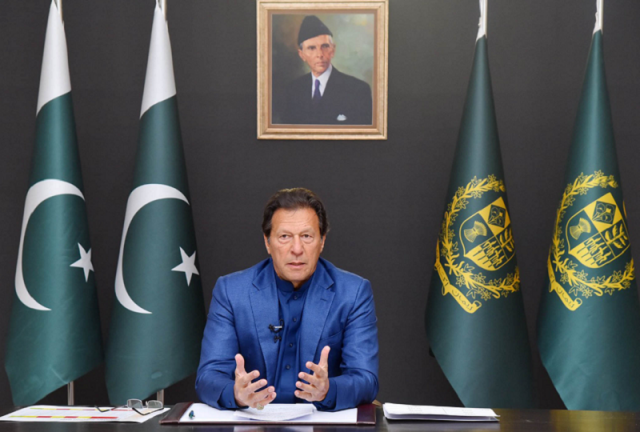EU Council president speaks with PM amid hiccup in ties
Imran hopes for a diplomatic deal over Ukraine conflict

A day after publicly criticising the European Union envoys for pressuring Pakistan into condemning Russia through an open letter, Prime Minister Imran Khan and European Council President Charles Michel held a telephonic conversation on the Ukraine crisis, an official statement said on Monday.
The phone call comes amid apparent strain in ties between Pakistan and the EU over the former’s refusal to condemn Moscow for invading Kyiv.
The statement began with President Charles Michel conveying condolences over the loss of precious lives in the terrorist attack on a mosque in Peshawar on March 4.
Discussing the latest situation in Ukraine, Prime Minister Imran expressed deep concern over the continued military conflict and underscored that further escalation would have hugely negative impact on the region and the world.
The prime minister added that he had been persistently highlighting the adverse economic impact of the conflict on the developing countries.
Emphasising that Pakistan has maintained a principled position that it would only be a partner for peace, the prime minster stressed the urgent need for a ceasefire and de-escalation. He also emphasised the importance of humanitarian relief for the civilians in Ukraine.
The prime minister underlined that Pakistan enjoyed friendly relations with Russia and Ukraine, and remained in close contact with both the sides. The prime minister expressed the hope that the dispute would be resolved through dialogue and diplomacy.
The two leaders agreed that countries like Pakistan could play a facilitating role in these endeavours and that both the sides would remain closely engaged in promoting shared objectives.
Underscoring the importance Pakistan attaches to its relations with the EU, the prime minister conveyed to the EU president that he was looking forward to his visit to Brussels to meet the EU leadership. He also extended an invitation to President Charles Michel to visit Pakistan.
The telephonic conversation comes against the backdrop of Islamabad’s unhappiness over western diplomatic missions' move to put pressure on Pakistan on the Ukrainian conflict.
Last week, ahead of the vote on a resolution at the UN General Assembly session, diplomats from 22 European Union and other countries penned a joint statement. The joint statement, which was also endorsed by the US Embassy in Islamabad, was posted on the social media platforms, urging Pakistan to condemn Russian action in Ukraine.
It was an unprecedented move on the part of the diplomatic missions, which otherwise convey such messages through usual diplomatic channels.
The move drew strong reaction from the Foreign Office, which called a group of ambassadors to convey to them that that was not the right approach to conduct diplomacy.
Read: Pakistan’s ‘neutrality’ on Ukraine crisis
“We took note of that and in a subsequent meeting with a group of Ambassadors, we expressed our concern about that, because as I said that is not the way diplomacy should be practiced, and I think they have realized,” Foreign Office spokesperson Asim Iftikhar had told reporters last week. Some of the European envoys who shared the joint statement on twitter later deleted it.
The spokesperson said using the social media platform was a tricky tool and one has to be careful in using them.
“Our ambassadors also use twitter abroad, but I think we use that in a responsible manner and the important thing is that there are always certain diplomatic norms and protocols that we understand are to be followed. It is not usual diplomatic practice to say such things through the media, and we have made that clear,” the spokesperson further said.
On Sunday, Prime Minister Imran Khan doubled down on the European ambassadors for what he said their double standards.
“I want to ask the European ambassadors, did you write such a letter to India? What do you think of us? Are we your slaves that whatever you say, we will do?” Imran said while addressing the public gathering in Mailsi.
Read: Pakistan calls for de-escalation in Ukraine
Pakistan has so far maintained a delicate balance on the Russia-Ukraine conflict, something that irked the West that wanted Islamabad to condemn Moscow’s actions. Pakistan was also made aware by the US of the possible consequences of siding with Russia.
But Islamabad is walking a tightrope since its growing ties with Moscow. It was because of the policy of neutrality that saw Pakistan abstaining from voting on a resolution condemning Russia at the UN General Assembly session as well as at the UN Human Rights Council, which voted in favour of inquiry into the human rights abuses by Russia in Ukraine.



















COMMENTS
Comments are moderated and generally will be posted if they are on-topic and not abusive.
For more information, please see our Comments FAQ